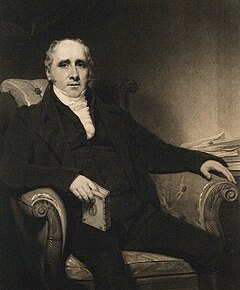Thomas Charles Hope
| Thomas Charles Hope | |
|---|---|
 |
|
| Born |
21 July 1766 Edinburgh |
| Died | 13 June 1844 (aged 77) Edinburgh |
| Nationality | Scottish |
| Fields | Chemistry, medicine |
| Institutions | Lecturer in chemistry, University of Glasgow Professor of medicine and chemistry, University of Edinburgh President, Royal College of Physicians of Edinburgh (1815-1819) |
| Alma mater | University of Edinburgh University of Paris |
| Thesis | Tentamen inaugurale, quaedam de plantarum motibus et vita complectens (1787) |
| Doctoral advisor | Joseph Black |
| Known for | Maximum density of water (Hope's experiment) Discovery of strontium |
Thomas Charles Hope FRSE FRS PRCPE FFPSG (21 July 1766 – 13 June 1844) was a Scottish physician and chemist. He discovered the element strontium, and gave his name to Hope's Experiment, which shows that water reaches its maximum density at 4°C.
In 1815 Hope was elected as president of the Royal College of Physicians of Edinburgh (1815–19), and as vice-president of Royal Society of Edinburgh (1823–33) during the presidencies of Walter Scott and Thomas Makdougall Brisbane.
He founded the chemical prize at Edinburgh.
Charles Darwin was one of Hope's students, and Darwin viewed his chemistry lectures as highlights in his otherwise largely dull education at Edinburgh University.
Born in Edinburgh, the third son of surgeon and botanist Dr John Hope and Juliana Stevenson, he lived at High School Yards on the south side of the old town. He was educated next door to his house at the High School, the University of Edinburgh (MD 1787) and the University of Paris. At the university he was a student of Prof Joseph Black.
...
Wikipedia
